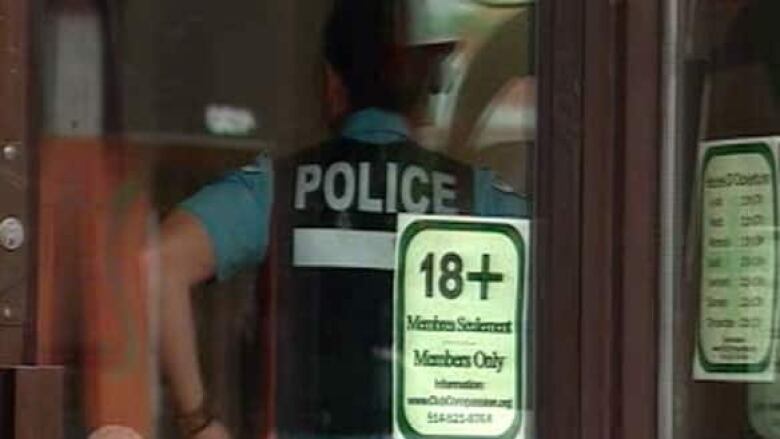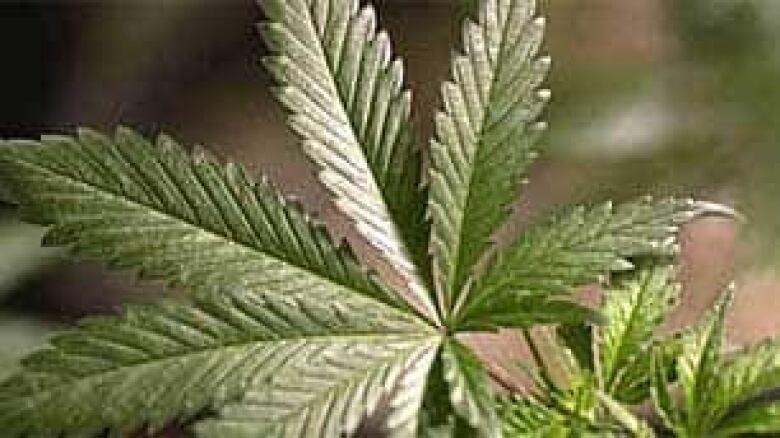Raids highlight gaps in medical marijuana program
Police shut down 5 compassion clubs in Quebec

St-Maurice was among 35 people arrested in the raids in Montreal and Quebec City, which targeted clubsthat sell marijuana to people who need the drug for medicinal purposes.
Police also seized just over 86 kilograms of marijuana and almost four kilos of hashish, which would put the street value of the seizure at just around $900,000.
They also confiscated about $39,000 in cash.
'Health Canada should not be in the business of selling marijuana ....They don't sell other drugs.' Marc-Boris St-Maurice, former Marijuana Party leader
Some clients of the clubs were receiving marijuana without the proper federal authorization, which constitutes illegal drug trafficking, police said.
St-Maurice runs a compassion club on St-Laurent Boulevard in Montreal, which wasamong those raided. He was released on a promise to appear in court at a later date and faces charges of drug trafficking, possession with intent to traffic and conspiracy.
He attributed the raids to the opening of a new compassion club in Montreal's borough of Lachine earlier this year.
"We've had excellent relations with our neighbours," said St-Maurice. "We've never received any complaints.
"We've been around for 10 years. We verify doctor's letters. We have very, very strict controls, and we've been tolerated for all this time. It is definitely not a coincidence that these new places open up which have a little looser criteria, and all of a sudden people are getting arrested."
Health Canada program criticized
Last month, the City of Montreal said it had asked its legal department to investigate compassion clubs after officials said they had received complaints about the Culture 420 club in Lachine.
An investigation by the French-language service of the CBC revealed the ease with which it was possible to obtain marijuana at the club.
An undercover reporter told workers atCulture 420 he was suffering from migraines.
Staff told him he would be able to obtain the drug after making a declaration that he needed it for medical reasons before a commissioner of oaths. They then directed him to a commissioner of oaths who worked in a nearby building.
Canadaoffers only one strain of medical marijuana, and the only legal way to purchase it is through Health Canada.
St-Maurice said that is a complex process that can take months.

"Health Canada should not be in the business of selling marijuana," he said. "They don't sell other drugs, so they shouldn't be doing that. They should be selling licences to people like us.
"We have the experience, and if Health Canada is selling medical marijuana, it is because of activists like ourselves. So, I don't see why they wouldn't want to sit down and legitimize what we are doingand [give] us legal licences so we can do it and do it properly."
Dr. Mark Ware, an assistant professor in family medicine and anesthesiaat McGill University who has been researching the effects of cannabis, agreed there is a need to review regulations surrounding access to medical marijuana.
He said many medical marijuana users prefer to get the drug from compassion clubs rather than ordering it from Health Canada because it is easier.
'The sad part is that it takes a few centres who abuse the medical marijuana privilege that we have in Canada to make a mockery of the whole program.' Dr. Mark Ware, McGill University
He compared the service provided by the clubs to "going to the corner storeto pick up your medication from the pharmacy" rather than "having to access your product from a single agency a long way from home."
"Along with cannabis, they get some information about how to use it and alternative methods of delivery," said Ware.
Many physicians simply don't understand the federal government's medical marijuana program or how it works, said Ware.
He called Thursday's raids unfortunate.
"I think the sad part is that it takes a few centres who abuse the medical marijuana privilege that we have in Canada to make a mockery of the whole program," he said. "I really worry that real patients with real pain and real needs are suffering as a result of that."
Users could turn to black market
The raids on the compassion clubs were also criticized by Conservative Senator Pierre-Claude Nolin.
Nolin says users of medicinal marijuana will now be forced to find it elsewhere, and the vast majority will wind up getting it from criminal gangs.
"It's the most disastrous consequence of the whole operation," said Nolin, a longtime advocate for therelaxing ofdrug laws.
"The vast majority will have to look at the black market and the substance on the black market is not exactly the quality substance that [is sold] in the clubs.
"In the clubs, they are trying to have access to organic cannabis, which is not the case with the black market."
Nolin said research suggests there are roughly one million Canadians who say they smoke cannabis for medical purposesbut less than 5,000 permits for medicinal marijuanahave been issued by Health Canada.

That means the vast majority will have to find their supply elsewhere, he said.
The federal Justice Department said it would not be commenting on the cases. All questions were referred to Health Canada.
In a statement, Health Canada said it is working on a review ofits Marijuana Medical Access Program.
"The department will focus on three key objectives: public safety and security; reasonable access to marijuana for medical purposes; and examining overall costs to the government," the statement read.
"Health Canada will ensure that any changes to the program will balance the need to provide reasonable access to a legal supply of marijuana for medical purposes and the department's responsibility to regulate it."
The Health Canada website says that, as of June 2009, 4,029 people had authorization to possess dried marijuana for medical purposes and 2,360 were allowed to cultivate or produce it.
The largest number of permits issued 1,631 was in Ontario, followed by 1,008 in British Columbia, 491 inNova Scotia, 305 in Quebec and 282 in Alberta.
With files from The Canadian Press












_(720p).jpg)


 OFFICIAL HD MUSIC VIDEO.jpg)
.jpg)



























































































